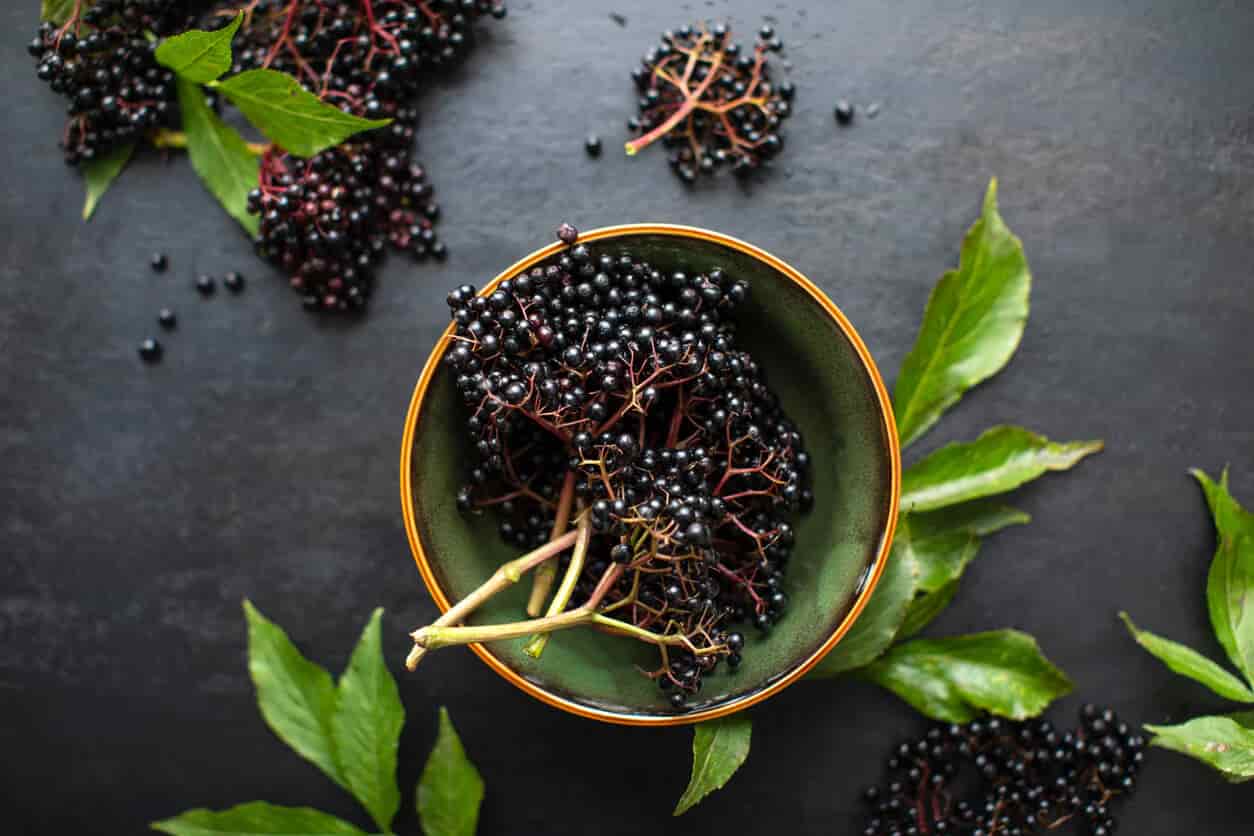Time to roll out the red carpet for our herb of the month—elderberry! You might think these berries are just winter’s best friend, but they’re your year-round sidekicks for keeping that immune system on point. Packed with flavor and a stash of health perks, elderberries are the ultimate secret weapon for your natural wellness arsenal.
So, let’s dive into why elderberry is such a superstar, and don’t miss our killer Elderberry Syrup recipe at the end!
Meet Elderberry: Nature’s Wild Child
Say hello to Sambucus nigra L., the European elder, the dazzling diva of the Caprifoliaceae family. This plant’s not just any shrub or tree—it’s the botanical equivalent of a rockstar, turning heads from Europe to North America. Standing between 4 and 25 feet tall, elderberry knows how to make an entrance.
With stems that are pithy (yes, pithy!), pairs of compound leaves, and clusters of cream-colored flowers that could make any floral arrangement jealous, elderberry has style. And when those flowers transform into vibrant red, blue, or purple berries, it’s like nature’s version of confetti. Find them near rivers, streams, forests, or even your backyard—elderberry is always ready for its close-up.
A Little History: Elderberry's Legendary Lore
Elderberry isn’t just a health hero; it’s been the star of ancient folklore for ages. Mess with an elder tree, and you might anger some supernatural beings—at least, that’s what the legends say. Back in the day, folks would hang elder branches around their doors to keep witches at bay. So, this plant wasn’t just for medicine; it was your personal bodyguard.
The name Sambucus hints at the elder tree’s musical past (ever heard of a harp made from elder wood?), while “elder” comes from the Anglo-Saxon word æld, meaning "fire." People even used hollow elder stems to stoke fires—talk about versatility! Written records of elderberry’s medicinal prowess date back to the 5th century. Hippocrates, Dioscorides, and Pliny the Elder were all fans!
Elderberry Today: Your Immune System’s BFF
Fast forward to today, and elderberries are still flexing their immune-boosting muscles. Loaded with flavonoids and anthocyanins, these tiny but mighty berries aren’t just eye candy—they’re serious health allies. They ease congestion, sooth respiratory irritations, and keep your heart happy too!
Get Elderberry into Your Diet (It’s Easier Than You Think!)
Adding elderberries to your diet is as easy as it is delicious. Here’s how to get started:
- Elderberry Smoothies: Blend elderberries into your morning smoothie for a vibrant, immune-boosting mix. Pair with spinach, chia seeds, and almond milk, and you’ve got a powerhouse breakfast.
- Elderberry Tea: Brew a comforting cup of elderberry tea. Add honey for sweetness, and let those inflammatory soothing properties work their magic on your sore throat.
- Elderberry Gummies: Who says gummies are just for kids? Make your own elderberry gummies for a fun, healthy treat. Plus, they’re a hit with everyone, regardless of age!
- Elderberry Jam: Spread a little elderberry jam on toast, swirl it into yogurt, or use it as a pastry filling. It’s like a health boost and a treat all rolled into one.
- Elderberry Syrup: Whip up homemade elderberry syrup with our simple recipe. Drizzle it over pancakes, mix it into oatmeal, or take it straight up for a daily immune boost.
[[ recipeID=recipe-8lzkd7lqg, title=Elderberry Syrup Recipe: DIY Wellness in a Bottle ]]
Elderberry Health Perks: So Much More Than Just Immune Support
Elderberry isn’t just a one-trick pony; it’s a multitasking health wonder. Here’s why you should make room for elderberry in your life:
- Immune Health: These berries are bursting with vitamins A, B, and C. They’re like a health cocktail that supports your immune system while fighting free radicals. Elderberry’s free radical scavenging superpowers are the secret weapon against the common cold and flu symptoms. And guess what? They taste great too!
- Heart Health: The anthocyanins in elderberries aren’t just pretty—they’re like little heart-shaped superheroes improving circulation and soothing the inflammatory response. Whether it’s supporting endothelial function or giving your arteries a little extra TLC, elderberries have your cardiovascular health covered.
- Respiratory Health: Got a cough or congestion? Elderberry’s got your back. Traditionally used to tackle colds and flu, elderberries help soothe nagging symptoms and keep your respiratory system in check.
Rebecca Younger is passionate about herbs and women's health. She aspires to plant seeds of inspiration within her community about plant medicine and healthier ways of life. She studied Herbal Medicine at Herbalism Roots in Denver and is a certified Doula through the Matrona Foundation. She is the Brand Communications Specialist at WishGarden Herbs.
For educational purposes only. This information has not been evaluated by the Food and Drug Administration. This information is not intended to diagnose, treat, cure, or prevent any disease, or to sell any product.
Recommended Products
Further Reading












